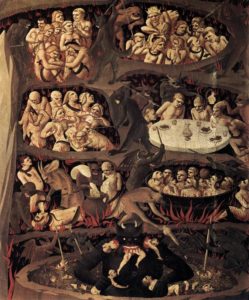The majority of my adult life has been spent within the conservative evangelical Calvinistic world of Desiring God, Grace to You, Ligonier and The Gospel Coalition. Having grown up in the rules-focused world of the independent, fundamental Baptists, these ministries provided a much-needed relief for me from the guilt and fear that so permeated every moment of my life growing up.
However, as I’ve deconstructed my theology and have left conservative evangelicalism, I’ve come to see how the theology of their flagship ministries is built on five pillars that are fundamentally incompatible with love.
Pillar One: God seeks self-glory
Our theology said that God’s primary concern is self-glory. John Piper put it this way: “God’s great aim in creating and governing the world is that he be glorified.”
We viewed salvation within the context of God’s self-glory. Salvation wasn’t primarily about saving humans from hell, but about glorifying God. The churches I led worship in wouldn’t even allow us to sing the song “Above All” because the lyrics say that Jesus “took the fall and thought of me above all.” Instead, we countered, “Jesus thought about God’s glory above all.”
“Salvation wasn’t primarily about saving humans from hell, but about glorifying God.”
In order to maximize God’s glory, we believed salvation is accomplished by faith in the life of Jesus earning a righteousness we had to but never could earn and in the death of Jesus paying the penalty we deserved to pay so that all the glory would be God’s. We also said our faith was breathed into us by God, given to a select number of people God predestined to go to heaven so that even our expression of faith would bring glory to God rather than to us.
Pillar Two: God is infinite wrath
The overflow of God’s self-glory, according to these men, is God’s wrath. David Schrock wrote for The Gospel Coalition: “God formed humanity to bring him glory. Yet, because we rebelled against his holy standard, the perfect judge of the universe has declared he will pour out his wrath upon those who have sinned against him without repentance or faith in his Son.”

A detail from “The Last Judgment,” a 13th century Byzantine ceiling mosaic at the Florence Baptistry.
Piper adds, “The wrath of God is owing to our sin, which exchanges the glory of God for the glory of man” and that God has “eternal wrath and fury.” In other words, according to these men, God’s wrath doesn’t last for a moment, but forever. It is never satisfied.
Pillar Three: God punishes every moment of every life
In the American Gospel: Christ Alone documentary, John MacArthur says: “Every sin ever committed by every person who has ever lived will be punished. That is required by divine holiness and divine righteousness and divine justice. It will either be punished everlastingly in the life of the sinner or that punishment will be borne by Christ.”
Consider for a moment what MacArthur means by “every sin.” These men believe that sin is any moment that is not thought, said, or done to the glory of God. So what does that mean for our everyday lives?
When I took my children trick or treating this year, we dressed up in a 101 Dalmatians theme. My wife and daughter dressed as Cruella, while my younger kids dressed up as puppies, and I threw on a jacket to be Cruella’s hitman Horace. As my kids scampered up the street with their puppy tails wagging, I thought to myself, “How would a self-glory-seeking God look at our evening?”
A self-glory seeking God would’ve been seething at each house as my kids awkwardly opened their bags for candy with no awareness of the glory of God. A self-glory seeking God would be burning with wrath as my wife and I were looking at our kids without connecting their joy to God’s glory. We could have no moments of innocent presence with our kids under this God’s wrathful eye. Every moment would be a reason for God to burn us all forever.
Pillar Four: God dishonors everyone through cursing
At the 2008 Together for the Gospel Conference, R.C. Sproul preached the infamous words: “The one who was pure was pure no more. And God cursed him. It was if there was a cry from heaven — excuse my language, but I can be no more accurate than to say — … ‘God damn you.’ Because that’s what it meant to be cursed. To be damned. To be under the anathema of the Father … Every person … across the world who has not been covered by the righteousness of Christ right this minute draws every breath under the curse of God.”

“The Pains of Hell,” from “The Last Judgement” by Fra Angelico, c. 1431, in the Museum of San Marco in Florence.
This language of glory and honor, wrath and curse, is hierarchical language. Because God is at the top of the hierarchy, God deserves glory and honor from those below. And when God doesn’t get glory and honor from those lower on the hierarchy, God exercises wrath by violently cursing them. In other words, God’s self-honoring is expressed in dishonoring everyone else below.
Pillar Five: God receives glory by our rejection of love
But how does all this talk of glory, honor, wrath and punishment fit with love?
1 Corinthians 13:5 says that love “does not dishonor others, it is not self-seeking, it is not easily angered, it keeps no record of wrongs.”
This one verse fundamentally disarms the first four pillars of conservative evangelical Calvinism. While they say God is seeking self-glory, Paul says love “is not self-seeking.” While they say God is infinite wrath, Paul says love “is not easily angered.” While they say God punishes every moment of life, Paul says love “keeps no record of wrongs.” And while they say God dishonors everyone through cursing, Paul says love “does not dishonor others.”
So how do these men think about love?
Paul Washer says, “The moment you take your first step through the gates of hell, the only thing you will hear is all of creation standing to its feet and applauding and praising God because God has rid the earth of you.”
In his book Captive to Glory, Piper quotes Jonathan Edwards saying: “The saints are … called upon to rejoice … in seeing the love and tenderness of God towards them, manifested in his severity towards their enemies. … This rejoicing will be the fruit of a perfect holiness and conformity to Christ … that the just damnation of the wicked will be an occasion of rejoicing to the saints in glory … to rejoice in seeing his love to them in executing justice on his enemies … for the heavenly inhabitants will know that it is not fit that they should love them, because they will know then, that God has no love to them, nor pity for them.”
In other words, these men rightly know that their glory theology is incompatible with any vision of love other than the self-glorying love of God. According to them, our love of God demands that we eternally celebrate that God has “no love to them, nor pity to them.”
“They know that truly loving yourself will open yourself to self-empathy rather than self-condemnation.”
And that’s exactly why these men are working so hard to warn us about empathy. They know that truly loving yourself will open yourself to self-empathy rather than self-condemnation. They know that having a posture of compassion and empathy for yourself will help you to recognize your neighbor’s wounds as well. And if you are moved with compassion and empathy for your neighbors, who these men believe are God’s enemies, then their hierarchy of glory, honor, wrath and punishment begins to crumble.
Disarming violence through love
In his new book Jesus Unarmed: How the Prince of Peace Disarms Our Violence, Keith Giles opens with a quote from Henry Wadsworth Longfellow: “If we could read the secret history of our enemies, we should find in each man’s life sorrow and suffering enough to disarm all hostility.”
If Jesus really is God, wouldn’t Jesus know the secret history of all his enemies? Wouldn’t Jesus know how our sorrow and suffering affect our lives in ways that we are unaware of? Might that explain why he said on the cross, “Father, forgive them, for they do not know what they are doing?”

“Jesus Shows Himself to Thomas” by Rowan and Irene LeCompte, one of six mosaic murals by artists Rowan and Irene LeCompte in the Resurrection Chapel at the National Cathedral in Washington, D.C.
Might that be why Paul said that “God was reconciling the world to himself in Christ, not counting people’s sins against them?”
Giles goes on to ask the question: “Is Christianity a religion of peace, or is it one where the Messiah is committed to making his enemies bleed?”
According to the hierarchical towers of the conservative evangelical Calvinists, God the Father is committed to making his enemies bleed, including his own Son.
But what if love has a better word for us? What if love “does not dishonor others … is not self-seeking … is not easily angered … (and) keeps no record of wrongs?”
And what if we developed our atonement theologies on this deeply centered, infinitely overflowing experience of love? The hierarchical towers of conservative evangelicalism that are fueling so much trauma and abuse today just might start to crack.

Rick Pidcock
Rick Pidcock is a freelance writer based in South Carolina. He is a former Clemons Fellow with BNG and recently completed a master of arts degree in worship from Northern Seminary. He is a stay-at-home father of five children and produces music under the artist name Provoke Wonder. Follow his blog at www.rickpidcock.com
Related articles:
It’s time to pay the Piper | Opinion by David Bumgardner
Have you heard the one about empathy being a sin?
Six ways ‘American Gospel’ is small-minded and abusive | Analysis by Rick Pidcock
Mohler says Christ died only for the ‘elect’


